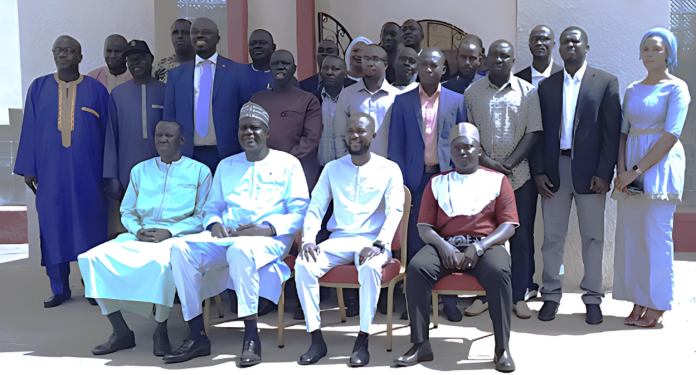By Sariba Manneh
According to the Solid Waste Authority (SWA) Report of 2019, The Gambia loses Six hundred and Thirty-Eight Million Dalasi (D638, 000,000) yearly which is equivalent to 12% of the country’s Gross Domestic Product (GDP).
This information was revealed by Musa Njie, the Acting Director of Petroleum, Water and Energy at the Public Utilities Regulatory Authority (PURA) at a day convergence organised by the regulatory body in collaboration with the Ministry of Health and other key stakeholders, including members of the Sanitary Tanker Trucks Association.
Njie earlier said that Faecal Sludge Management (FSM) has been one of the major challenges as urbanisation intensifies globally. Considering that the majority of the population relies on on-site sanitation, FSM is a crucial component for achieving the National Development Plan and Sustainable Development Goals 6 (Water & Sanitation) and 3 (Health and Wellbeing) targets.
“As you may be aware of the direct relationship between diseases and the unrestricted discharge of residential sewage, the current practices in faecal sludge management in The Gambia, especially on sewage transport can render major risks to human health and the environment,” Njie added.
The aim of the convergence was for the said institutions and partners to discuss Regulation of Faecal Sludge Management in The Gambia: Developing a Regulatory Framework for Sewage Transportation.
Speaking at the event, the Director General of PURA, Dr Njogou L. Bah, said the Management of faecal sludge is a complex challenge that requires a multi-faceted approach involving collaboration among government agencies, private sector entities, civil society organizations, and the community at large.
“By coming together today, ( MoH, MoLG, NA, UNICEF, WHO, PURA, NEA, NAWEC, Ministry of Water Resources, Gambia Standards Bureau, Municipals and Area Councils, Sanitary Tanker Trucks Association, etc.), we demonstrate our commitment to finding innovative solutions and establishing robust regulatory frameworks that will guide and govern faecal sludge management practices in The Gambia,” he said.
Dr Bah added that through the inception meeting, they aim to identify key challenges, explore best practices, and lay the foundation for comprehensive regulations that will promote safe and sustainable faecal sludge management across the country.
“As the Director General of the Public Utilities Regulatory Authority (PURA), I am delighted to see stakeholders from various sectors gathered here to address the pressing issues of faecal sludge management. The proper handling and disposal of faecal waste are paramount to safeguarding public health, protecting our environment, and fostering sustainable development,” he said.
He said he believes that developing a regulatory framework that brings sewage transporters under functional oversight will not only aim to mitigate the risks associated with current practices, but also professionalize the sub-sector.
“I am confident that with our collective expertise, dedication, and determination, we can make significant strides in tackling the menace of poor sewage management, and regulate faecal sludge management in The Gambia. Let us seize this opportunity to drive positive change, build a healthier and cleaner environment for all our citizens, and set a shining example for others to follow,” he concluded.
On his part Dr. Buba Manjang, Director of Public Health Services representing the Minister of Health, said as the custodian of sanitation policy in The Gambia, he is aware of the challenges people face and the urgent need for collective action to ensure the safety and well-being of citizens.
“The regulation of sanitary tanker trucks is a critical component of our overall efforts to promote public health and environmental sustainability. These trucks play a vital role in transporting human waste and other hazardous materials, and it is imperative that they operate in a safe and responsible manner,” he said.
Manjang added that they have made significant progress in improving sanitation infrastructure and practices in The Gambia, saying that there is still much work to be done. He said the regulation of sanitary tanker trucks is a key step towards ensuring that waste management is carried out in a safe, efficient, and environmentally sustainable manner.
“I am committed to working closely with all stakeholders and partners to develop comprehensive and effective regulations for sanitary tanker trucks. This will require a collaborative approach that brings together government agencies, private sector stakeholders, and civil society organizations to develop policies that are grounded in evidence-based research and best practices.”
He highlighted that it is essential that they prioritize the health and well-being of citizens in all of their efforts to improve sanitation practices in The Gambia. He added: “By regulating sanitary tanker trucks, we can mitigate the risks associated with the improper handling and disposal of waste, and reduce the prevalence of waterborne diseases and other public health concerns.”
Manjang stated that education and capacity-building are also essential components of their regulatory efforts, calling for more investment in training programmes, awareness campaigns, and technical assistance to enhance the skills and knowledge of all those involved in the operation of sanitary tanker trucks.
“By empowering individuals and organizations with the necessary tools and information, we can foster a culture of safety and professionalism in the waste management sector. I am committed to working with our international partners and donors to secure the necessary resources and technical assistance to support our regulatory efforts. Collaboration with the global community will allow us to leverage the expertise and resources needed to develop and implement a world-class regulatory framework for sanitary tanker trucks in The Gambia,” he concluded.




















